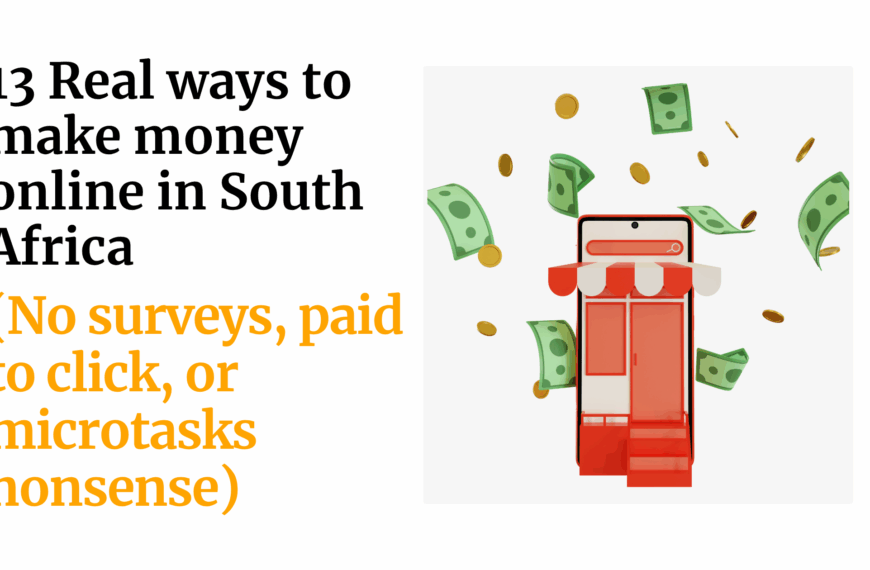Forex trading has become one of the most accessible and potentially lucrative ways to make money in South Africa.
The rise of online trading platforms, combined with the country’s favorable regulatory environment, has made it easier than ever for individuals to participate.
However, forex trading is not a guaranteed way to make money — it requires knowledge, discipline, and a solid strategy.
If you want to succeed in forex trading and make consistent profits, follow this detailed guide.
Table of Contents
1) Understand the Forex Market
Before you even think about placing your first trade, you must understand how forex works.
The forex market operates 24 hours a day, five days a week and is the largest financial market globally, with a daily trading volume exceeding $7 trillion.
Key forex market concepts:
- Currency pairs: Forex trading involves the exchange of one currency for another.
Popular pairs in South Africa include:- USD/ZAR – The exchange rate between the U.S. dollar and the South African rand
- EUR/USD – The most traded currency pair globally
- GBP/USD – Another widely traded pair known for its volatility
- Pips and spreads: A pip (percentage in point) measures price movements. The spread is the difference between the buy (ask) and sell (bid) price of a currency pair.
- Leverage: Allows you to control a larger trade size with a smaller deposit. While leverage can amplify profits, it also increases risk.
- Trading sessions: The forex market has different trading sessions:
- Asian session: Low volatility
- European session: High liquidity
- U.S. session: High volatility, especially for USD pairs
- Overlap period: The most volatile time to trade (when European and U.S. markets are open simultaneously)
By understanding these basics, you can make informed trading decisions.
2) Choose a Reliable Forex Broker
Your choice of broker can determine your success in forex trading.
A good broker should be regulated, offer low spreads, fast execution, and provide access to various trading tools.
What to look for in a forex broker:
- FSCA regulation: The Financial Sector Conduct Authority (FSCA) regulates forex brokers in South Africa. Ensure your broker is FSCA-approved to avoid scams.
- Trading platforms: Look for brokers that offer MetaTrader 4 (MT4), MetaTrader 5 (MT5), or cTrader.
- Spreads and commissions: Lower spreads mean less cost per trade.
- Leverage options: Some brokers offer up to 1:1000 leverage, but beginners should be cautious.
- Deposit and withdrawal methods: Choose brokers that allow easy deposits and withdrawals via bank transfer, PayPal, Skrill, or Bitcoin.
- Educational resources and customer support: Good brokers offer webinars, demo accounts, and market analysis.
Top FSCA-regulated brokers in South Africa:
- Exness – Best for low spreads and fast execution
- HotForex – Good for beginners and offers copy trading
- XM – Excellent educational resources and bonuses
- IG Markets – Best for advanced traders with a variety of assets
Choose a broker that suits your trading style and financial goals.
3) Develop a Profitable Trading Strategy
Successful forex traders don’t rely on luck. They use well-researched strategies that give them an edge over the market.
Popular forex trading strategies:
- Scalping:
- Involves making multiple small trades within a short period (seconds to minutes).
- Works best during high-volatility periods, such as the London-New York session overlap.
- Requires fast execution and low spreads.
- Day trading:
- Traders open and close positions within the same day, avoiding overnight risks.
- Involves technical analysis and reacting to market news.
- Best for traders who can monitor charts throughout the day.
- Swing trading:
- Involves holding trades for several days to weeks to capture larger price movements.
- Requires trend-following indicators like Moving Averages and RSI.
- Less stressful than scalping or day trading.
- Position trading:
- A long-term strategy based on fundamental analysis.
- Traders hold positions for weeks or months, focusing on economic trends.
- Ideal for those with a high patience level and strong capital base.
Whichever strategy you choose, stick to a plan and refine it over time.
4) Manage Risk Effectively
Risk management is one of the most crucial aspects of forex trading.
Without proper risk management, even the best strategies can lead to huge losses.
Risk management tips:
- Use Stop-Loss Orders: Always set a stop-loss to limit your losses on a trade.
- Risk 1-2% per trade: Never risk more than 1-2% of your total capital on a single trade.
- Avoid over-leveraging: Leverage can amplify both profits and losses, so use it cautiously.
- Diversify trading pairs: Don’t put all your money into one currency pair—spread your risk.
By following these principles, you can protect your trading account from significant losses.
5) Take Advantage of South Africa’s Economic Events
The South African rand (ZAR) is highly volatile, meaning you can profit from major economic events.
Events that impact the ZAR:
- South African Reserve Bank (SARB) interest rate decisions
- Inflation reports and unemployment data
- Political stability and government policies
- Commodity price movements (gold, platinum, and coal)
Follow an economic calendar to stay informed about important events affecting the forex market.
6) Utilize Automated Trading and Copy Trading
If you’re a beginner, you can take advantage of automated trading tools.
Automated trading options:
- Copy trading: Platforms like eToro and ZuluTrade allow you to copy successful traders.
- Expert Advisors (EAs): These are AI-based trading bots that execute trades based on preset conditions.
Automated tools help remove emotional bias from trading.
7) Take Advantage of Forex Bonuses
Many brokers offer deposit bonuses, no-deposit bonuses, and cashback incentives to attract traders.
However, always read the terms before accepting them.
Best forex bonuses in South Africa:
- XM – $30 no-deposit bonus
- FBS – 100% deposit bonus
- HotForex – Loyalty program rewards
Bonuses can give you extra capital, but they come with conditions, so use them wisely.
8) Withdraw Profits and Reinvest Wisely
Making money in forex is not just about earning profits; it’s about managing those profits effectively.
Best practices for profit withdrawal and reinvestment:
- Withdraw profits regularly: Don’t keep all your money in the broker’s account.
- Reinvest strategically: Compound your gains for steady growth.
- Keep records: Analyze past trades to refine your strategy.
Final Thoughts
Forex trading in South Africa is a legitimate and profitable opportunity if you take the time to learn, practice, and develop a strong strategy.
Key Takeaways:
✅ Learn the forex market before investing
✅ Choose an FSCA-regulated broker
✅ Use a profitable trading strategy
✅ Implement risk management
✅ Stay updated on economic events
✅ Utilize copy trading or automated bots
✅ Withdraw profits and reinvest wisely
Are you ready to start? Open a demo account, practice your strategies, and transition to real trading once you’re confident!
 Web Hosting
Web Hosting Windows HostingBuilt for Windows apps and websites – stability, speed and flexibility
Windows HostingBuilt for Windows apps and websites – stability, speed and flexibility Reseller HostingLaunch a hosting business without technical skills or expensive infrastructure
Reseller HostingLaunch a hosting business without technical skills or expensive infrastructure Affiliate ProgramRefer customers and earn commissions from sales across our platform
Affiliate ProgramRefer customers and earn commissions from sales across our platform Domain SearchFind and secure a domain name in seconds with our quick lookup tool
Domain SearchFind and secure a domain name in seconds with our quick lookup tool CO ZA Domains
CO ZA Domains All DomainsExplore domain names from over 324 TLDs globally – all in one place
All DomainsExplore domain names from over 324 TLDs globally – all in one place Free Whois Lookup Tool South Africa
Free Whois Lookup Tool South Africa VPS
VPS SSLs
SSLs









